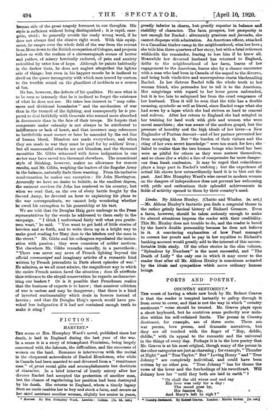FICTION.
HARVEST. *
TEM scene of Mrs. Humphry Ward's novel, published since her death, is laid in England during the last year of the war. In a sense it is a story of triumphant Feminism, being largely concerned with the labours, the difficulties, and the successes of women on the land. Romance is interwoven with the recital in the chequered antecedents of Rachel Henderson, who while in Canada had been married to and divorced from a " remittance man " of, great social gifts and accomplishments but destitute of character. In a. brief interval of lonely misery after her divorce Rachel had accepted the protection of another man, but the chance of regularizing her position had been destroyed by his death. She returns to England, where a timely legacy from an uncle enables her to buy and stock a farm, and secure as her chief assistant another woman, slightly her senior in years,
• Rama. By 51a. Bumphry Ward.. Landau: Oahu. 17e. 6d. net.1 greatly inferior in charm, but- greatly superior in balance and stability of character. The farm prospers, but prosperity is not enough for Rachel : alternately gracious and faroualte„ she cannot dispense with admiration. An American officer, attached to a Canadian timber camp in the neighbourhood, wins her love ; she tells him three-quarters of her story, but with a fatal reticence withholds the remainder, fearing to lose him if he knew all. Meanwhile her divorced husband has returned to England, drifts to the neighbourhood of her farm, learns of her engagement to the American, learns also by a chance encounter with a man who had been in Canada of the sequel to the divorce, and being both vindictive and unscrupulous starts blackmailing Rachel. In her distress Rachel tells the whole truth to her woman friend, who persuades her to tell it to the American. Her misgivings with regard to her lover prove unfounded, but it is too late to safeguard her from the cruel vengeance of her husband. Thus it will be seen that the title has a double meaning, symbolic as well as literal, since Rachel reaps what she had sown by a lapse which she had striven so hard to conceal and redeem. After her return to England she had mingled in her training for land work with girls and women who were moral anarchists ; she was aware of the modem gospel, but the pressure of heredity and the high ideals of her lover—a New Englander of Puritan descent—and of her partner prevented her from accepting it. But " the burden of their virtues and the sting of her own secret knowledge" were too much for her; she failed to realize that the two human beings who loved her beat were as pitiful for others as they were austere themselves, and so chose (for a while) a line of compromise far more danger- ous than frank confession. It may be urged that coincidence plays a large part in Rachel's undoing ; but the experience of actual life shows how extraordinarily hard it is to blot out the past. And Mrs. Humphry Ward's wise caveat to modem women on the dangers of independence does not prevent her welcoming with pride and enthusiasm their splendid achievements in fields of activity opened to them by their country's need.


































 Previous page
Previous page